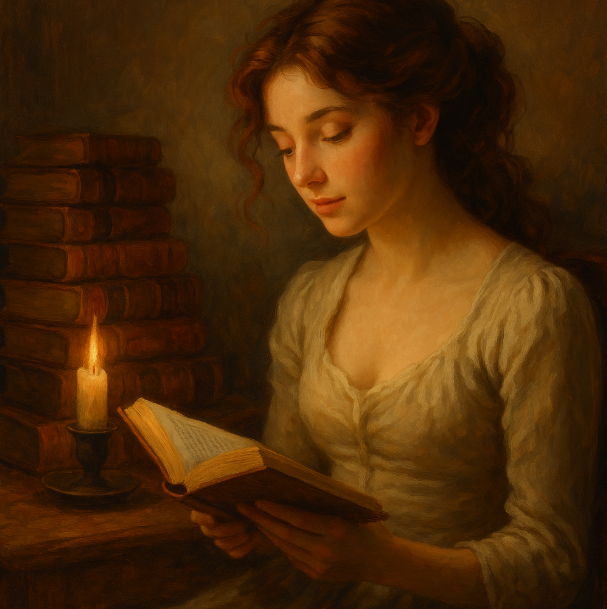I love books so much. I read at least 3 books per week. I am addicted to learning, or escaping into another world. I realised this week I have read over 400 book this year already and thankfully most were digital, but not all by any means. Am I in the minority? I do not think so. In an era where our attention is pulled in a dozen directions at once, it is tempting to think that classic literature might be quietly slipping away into obscurity. With endless scrolling feeds, bite-sized video clips, and the immediacy of streaming platforms, why would a reader choose to immerse themselves in a novel written more than a hundred years ago? And yet, the evidence says otherwise. From bustling second-hand bookshops to thriving online reading communities, the great works of literature are not only surviving but thriving. They continue to attract new audiences, inspire reinterpretations, and spark conversations that bridge generations.
Themes That Transcend Time
One of the most compelling reasons for their enduring relevance lies in the universality of their themes. Human nature has not changed as much as our technology. Love, ambition, jealousy, betrayal, and the search for identity remain central to our lives, just as they were for the people who first read these books when they were new. Jane Austen’s Pride and Prejudice still delights readers with its sharp social observations and wit; Shakespeare’s plays continue to move audiences with their insight into human frailty; and Charles Dickens’s depictions of poverty and inequality resonate in a world that still struggles with the same injustices.
These works offer something far beyond nostalgia. They are a reminder that the joys and sorrows we feel today were felt, with equal intensity, centuries ago. In the words of William Faulkner, “The past is never dead. It’s not even past.”
A Different Kind of Pace
In a world built on speed, classic literature invites us to slow down. Modern media is designed to deliver instant satisfaction, but the great novels of the past ask for — and reward — patience. Their long, winding sentences, layered character arcs, and intricate plots encourage a kind of reading that is immersive rather than fleeting.
Settling into a classic novel is a little like enjoying a slow, carefully prepared meal after weeks of grabbing fast food. The flavours are complex, the textures unexpected, and the satisfaction lingers. For many readers, that contrast is precisely the appeal.
Adaptation and Reinvention
Part of what keeps classics alive is their remarkable adaptability. Each generation reshapes them to reflect its own concerns and cultural tastes. From cinematic reinterpretations such as Baz Luhrmann’s shimmering The Great Gatsby to modernised stage versions of Hamlet, these retellings bring fresh perspectives without losing the core truths that made the originals powerful.
Even the most traditional works find new life in surprising formats. You might encounter Pride and Prejudice as a web series, The Odyssey as a graphic novel, or Dracula as an interactive podcast. These adaptations do more than introduce classics to new audiences; they prove that the themes and ideas at their heart are flexible, resilient, and infinitely relevant.
The Reader’s Time Machine
Reading classic literature is a unique form of time travel. Through these works, we enter the worlds our predecessors inhabited — not in the reconstructed form of costume dramas or museum exhibits, but in their own words. The language may be unfamiliar at first, but it carries with it the rhythms, values, and daily concerns of its time.
Yet, despite the historical distance, there is often a shock of recognition: a character’s longing, a moral dilemma, or a moment of joy that feels entirely modern. This duality — the sense of being both far away and intimately close — is part of what makes the experience so enriching.
Why Classics Still Matter
Some may argue that the classics are outdated, too bound to the social and political realities of their eras to be relevant today. But engaging with these works offers more than entertainment; it strengthens critical thinking, expands empathy, and deepens cultural awareness. Classics challenge us with unfamiliar ideas, confront us with uncomfortable truths, and broaden our understanding of what it means to be human.
Moreover, they serve as a foundation for much of our contemporary storytelling. Many modern plots, archetypes, and character types trace their lineage directly to the pages of these earlier works. To read a classic is not only to experience a great story but also to better understand the DNA of today’s literature.
Conclusion: A Conversation Across Centuries
Classic literature is not an ornament gathering dust on the cultural mantelpiece. It is a living, evolving conversation between the past and the present. In reading these works, we discover that the human heart — in all its contradictions and complexities — has changed far less than the world around it.
Whether you discover them in a quiet library, download them onto an e-reader, or listen to them performed aloud, the classics still have the power to stop us in our tracks, stir our emotions, and leave us thinking long after the final page is turned. In their pages, the past is never truly past — it speaks, it listens, and it lives again.
✍️ Submit a Guest Post
Not a member yet? You can still share your creative voice with our readers. We welcome guest posts from artists, writers, and creative souls of all kinds.
Submit Your ArticleShare this link with your friends if you enjoyed the post 🙂 See the share buttons below to your right


